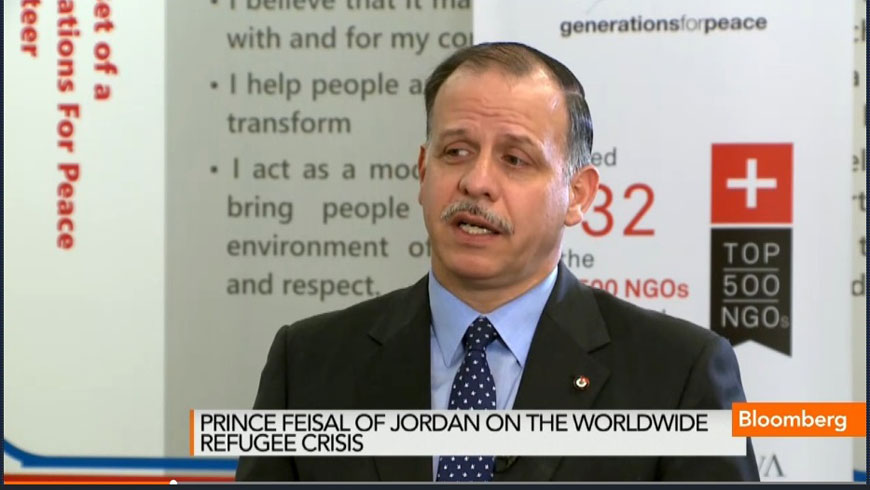AMMAN – HRH Prince Feisal on Monday said the more aid Jordan receives, the more it can help Syrian refugees as the Kingdom has been shouldering a large share of the burden despite limited resources.
The remarks were made in an exclusive interview with Bloomberg Television that was aired Monday coinciding with United Nations International Day of Peace 2015. Prince Feisal is the founder and chairman of Generations For Peace.
Asked by Bloomberg Television Middle East editor Elliott Gotkine on the EU’s contribution to the refugee crisis, the Prince said that the numbers of Syrian refugees Europe has to absorb now is nothing compared to the numbers absorbed by Syria’s neighbours.
“I think that the countries that are trying to play their part understand the human tragedy that has led to this influx of refugees and are trying to cope with it. But at some point in time, again, they have got to look at what resources they have available, how easy it is, and how they can better absorb. So I think there is, by and far, an acceptance that this is something that Europe needs to do for humanitarian reasons,” he added.
Responding to a question whether it is fair to say that as a whole, Europe has not stepped up to shoulder its fair share of the responsibility, Prince Feisal said that a number of countries have tried to do their best, but Europe is a number of different countries, not all of them have the same idea, or commitment.
"I don’t think it’s fair to try and brush all of them in the same stroke. I think that people are trying to cope the best that they can, I think that they recognise that this is a lot bigger problem than what had originally been planned for,” he said.
On Jordan’s ability to handle the refugee crisis, Prince Feisal said there is “only so much Jordan, with its limited capabilities, can do”, adding that the international community has helped shoulder part of that burden, but with donor fatigue and other issues, and with five years into this crisis, Jordan is shouldering the burdens more and a more on its own.
In the interview, Gotkine said that for a European, they see Syrians being of a similar culture, similar religion by-and-large and same language of Jordan, and that integrating them in a country like this should be easy, asking "is it as straightforward as that?"
The Prince replied: "The real issue for us is that when you’re looking at the integration of communities, you’ve got an influx. So when you look at schooling, prior to the crisis, we had gone basically almost across the country into a one-shift programme for schools. Now we’re having to do double shifts in order to be able to deal with the number of students that are going to schools. When you look at housing, when you’re looking at… infrastructure, even the health services, all of these put a burden, and you will have some Jordanians sit there and say, what about us? Why are we spending so much money on refugees, shouldn’t we be looking after ourselves? So you do get those types of tensions that build, and it’s primarily because we have limited resources,” the Prince replied.
Asked on contributions to the refugee crisis from Gulf states, Prince Feisal said there is always more that can be done, adding that a number of programmes and refugee camps are being funded by the Gulf states.
"I think they are trying to help. But under the circumstances, would we say no to more help, more aid? The more we have, the more we can help these refugees with. But I don’t think it’s fair to sit there and criticise them saying that they haven’t done their part. Each country is doing the best that they can, in the way that they can. But for countries at the front line, they could always do more,” he added.
Prince Feisal spoke about Generation For Peace, indicating that there are two major programmes. One is reduction of violence in schools implemented in cooperation with the Ministry of Education, while the other is implemented in host communities as it aims at bringing Jordanian and Syrian children together to encourage them learn to work and play together.
